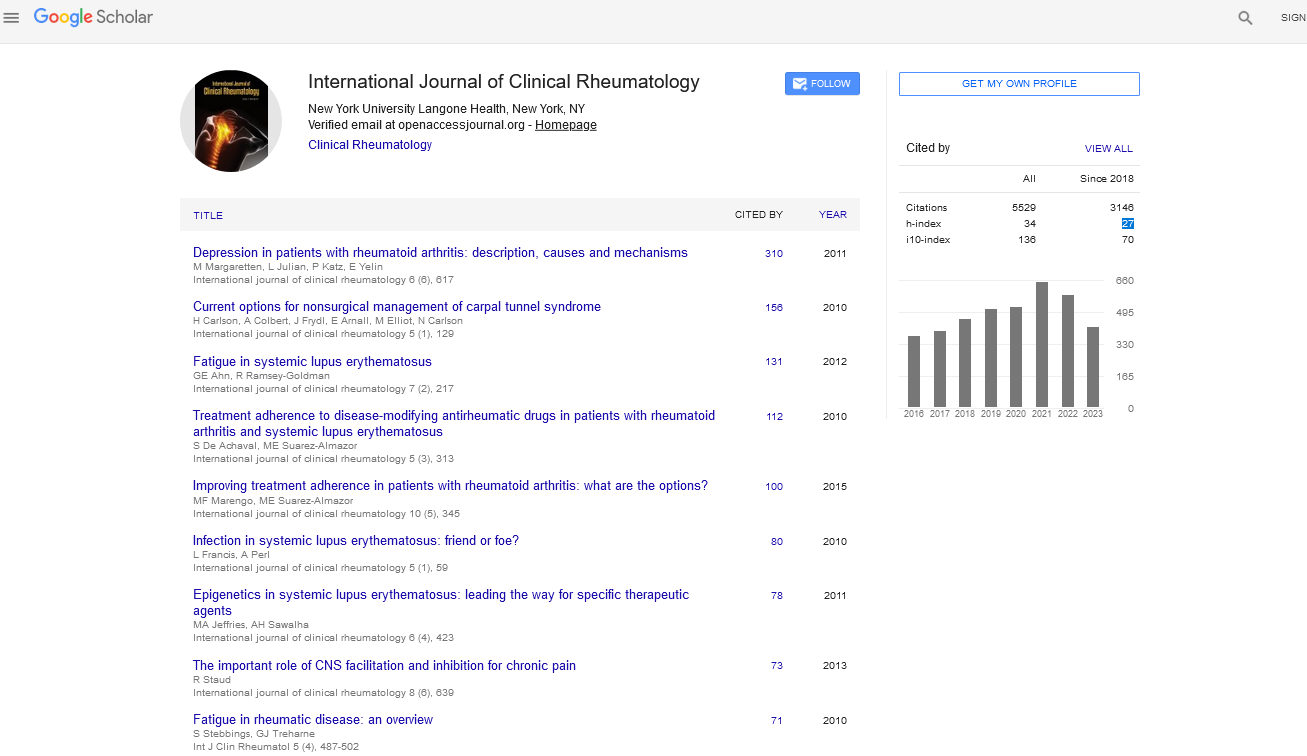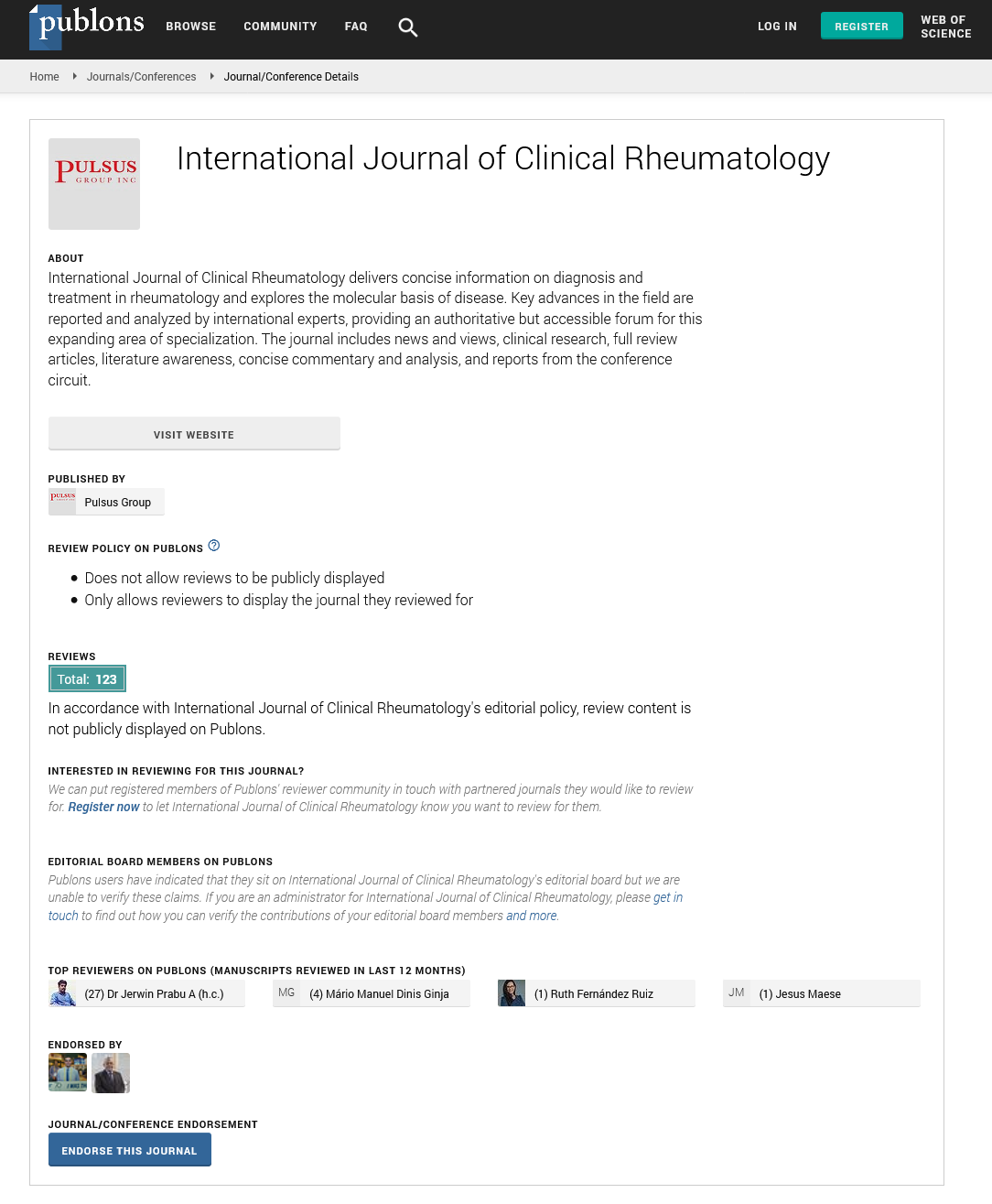Case Report - International Journal of Clinical Rheumatology (2024) Volume 19, Issue 8
Chronic Fatigue Syndrome Following Rheumatic Fever: A Unique Case Report with Implications for Long-Term Management
Ashima Sen Roy*
Department of Biochemistry, University of Bardhamann, India
- *Corresponding Author:
- Ashima Sen Roy
Department of Biochemistry, University of Bardhamann, India
E-mail: ashima78@hotmail.com
Received: 01-Aug-2024, Manuscript No. fmijcr-24-150802; Editor assigned: 03- Aug-2024, Pre-QC No. fmijcr-24-150802 (PQ); Reviewed: 16-Aug-2024, QC No. fmijcr-24-150802; Revised: 22-Aug- 2024, Manuscript No. fmijcr-24-150802 (R); Published: 29-Aug-2024, DOI: 10.37532/1758-4272.2024.19(8).218-220
Abstract
Fibromyalgia is a chronic pain condition characterized by widespread musculoskeletal pain, fatigue, and cognitive disturbances. This case study examines a 45-year-old female with a history of inflammatory arthritis who presented with new-onset fibromyalgia symptoms. The study emphasizes the need for comprehensive evaluation in patients with prior rheumatic diseases, as overlapping symptoms can complicate diagnosis and management.
Keywords
Fibromyalgia • inflammatory arthritis • Chronic pain • Diagnosis
Introduction
Chronic Fatigue Syndrome is a complex disorder marked by persistent and unexplained fatigue, alongside other symptoms such as sleep disturbances, cognitive dysfunction, and musculoskeletal pain. While the etiology of CFS remains unclear, post-infectious fatigue syndromes have been recognized, particularly following viral infections or other inflammatory illnesses. Rheumatic fever, a complication of untreated streptococcal throat infections, can have lasting effects, including potential contributions to the development of CFS. This case report details the clinical course of a patient who developed CFS after experiencing rheumatic fever, highlighting the need for awareness among healthcare providers regarding this potential sequel [1-3].
Case Presentation
Patient History
A 30-year-old female presented to the clinic with complaints of profound fatigue, difficulty concentrating, and muscle aches that had persisted for over six months. Her medical history included a confirmed diagnosis of rheumatic fever at age 14, which had been treated effectively with antibiotics and anti-inflammatory medications. Following her recovery from rheumatic fever, she had no significant health issues until the onset of her current symptoms [4, 5].
Clinical Symptoms
The patient reported that her fatigue was overwhelming, to the point where it interfered with her ability to perform daily activities, including work and social interactions. She described a feeling of physical exhaustion that worsened with minimal exertion. Additionally, she experienced cognitive difficulties, including problems with memory and concentration, as well as sleep disturbances characterized by non-restorative sleep [6].
Physical examination revealed no signs of active infection or inflammatory processes. Routine laboratory tests, including complete blood count, thyroid function tests, and inflammatory markers, returned normal results. A comprehensive evaluation was conducted to rule out other potential causes of her symptoms, including autoimmune disorders and infectious diseases [7].
Diagnosis
Based on the clinical presentation and exclusion of other conditions, the patient was diagnosed with Chronic Fatigue Syndrome. The criteria for CFS were met, including persistent fatigue, post-exertional malaise, and cognitive impairment. The timing of her symptoms in relation to her history of rheumatic fever suggested a potential link between the two conditions [8].
Discussion
The Link Between Rheumatic Fever and CFS
Rheumatic fever is an autoimmune response to streptococcal infection that can lead to a range of complications, including carditis, arthritis, and neurological manifestations. Emerging evidence suggests that post-infectious fatigue syndromes can occur after various infections, and it is plausible that rheumatic fever may trigger a similar response in some individuals. The mechanisms underlying this phenomenon may involve persistent inflammation, immune dysregulation, or alterations in neuroendocrine function.
Implications for Long-Term Management
Recognizing the potential for CFS to develop following rheumatic fever is crucial for healthcare providers. Early identification and appropriate management can significantly improve patient outcomes. Long-term management strategies for this patient included:
Comprehensive Assessment: Continuous monitoring of symptoms and regular follow-up appointments were scheduled to track her progress and adjust management as needed.
Multidisciplinary Approach: Involvement of a multidisciplinary team, including rheumatologists, neurologists, and mental health professionals, was essential to address the complex nature of her symptoms and provide holistic care.
Pharmacological Interventions: Although there is no specific medication for CFS, treatment focused on alleviating specific symptoms. Antidepressants and anxiolytics were considered to help manage associated mood disorders and improve sleep quality.
Cognitive Behavioral Therapy (CBT): CBT was recommended to help the patient develop coping strategies and address the psychological aspects of her fatigue. Engaging in therapy can empower patients to manage their symptoms and improve their quality of life.
Lifestyle Modifications: Encouraging gradual increases in physical activity was essential. A tailored exercise program that focused on pacing and gradual exertion was developed to avoid exacerbation of symptoms.
Patient Education: Educating the patient about CFS, its potential triggers, and self-management strategies was a vital component of her care plan. Understanding her condition could reduce anxiety and improve her ability to cope with the challenges she faced.
Prognosis and Future Considerations
The prognosis for patients developing CFS following rheumatic fever can vary. Some individuals may experience gradual improvement over time, while others may face persistent symptoms. Ongoing research into the pathophysiology of CFS may provide insights into targeted therapies and preventive strategies.
Healthcare providers should remain vigilant in monitoring patients with a history of rheumatic fever for signs of CFS, recognizing that early intervention can mitigate the impact of this debilitating condition. Furthermore, raising awareness about the potential long-term consequences of rheumatic fever within the medical community can foster better patient care [9-10].
Conclusion
This unique case report illustrates the possible connection between rheumatic fever and the subsequent development of Chronic Fatigue Syndrome. The complexities of managing CFS require a comprehensive, multidisciplinary approach to ensure effective treatment and support for affected patients. By acknowledging the potential for CFS as a sequela of rheumatic fever, healthcare providers can enhance their diagnostic acumen and improve long-term management strategies for patients navigating the challenges of chronic fatigue.
References
- Bhattacharya D, Bhattacharya H, Thamizhmani R, Sayi DS, Reesu R, et al. (2014) Shigellosis in Bay of Bengal Islands, India: Clinical and seasonal patterns, surveillance of antibiotic susceptibility patterns, and molecular characterization of multidrug-resistant Shigella strains isolated during a 6-year period from 2006 to 2011. Eur J Clin Microbiol Infect Dis 33: 157-170.
- Bachand N, Ravel A, Onanga R, Arsenault J, Gonzalez JP (2012) Public health significance of zoonotic bacterial pathogens from bushmeat sold in urban markets of Gabon, Central Africa. J Wildl Dis 48: 785-789.
- Saeed A, Abd H, Edvinsson B, Sandström G (2009) Acanthamoeba castellanii an environmental host for Shigella dysenteriae and Shigella sonnei. Arch Microbiol 191: 83-88.
- Iwamoto M, Ayers T, Mahon BE, Swerdlow DL (2010) Epidemiology of seafood-associated infections in the United States. Clin Microbiol Rev 23: 399-411.
- Von-Seidlein L, Kim DR, Ali M, Lee HH, Wang X, Thiem VD, et al. (2006) A multicentre study of Shigella diarrhoea in six Asian countries: Disease burden, clinical manifestations, and microbiology. PLoS Med 3: e353.
- Germani Y, Sansonetti PJ (2006) The genus Shigella. The prokaryotes In: Proteobacteria: Gamma Subclass Berlin: Springer 6: 99-122.
- Aggarwal P, Uppal B, Ghosh R, Krishna Prakash S, Chakravarti A, et al. (2016) Multi drug resistance and extended spectrum beta lactamases in clinical isolates of Shigella: a study from New Delhi, India. Travel Med Infect Dis 14: 407–413.
- Taneja N, Mewara A (2016) Shigellosis: epidemiology in India. Indian J Med Res 143: 565-576.
- Farshad S, Sheikhi R, Japoni A, Basiri E, Alborzi A (2006) Characterizationof Shigella strains in Iran by plasmid profile analysis and PCR amplification of ipa genes. J Clin Microbiol 44: 2879–2883.
- Jomezadeh N, Babamoradi S, Kalantar E, Javaherizadeh H (2014) Isolation and antibiotic susceptibility of Shigella species from stool samplesamong hospitalized children in Abadan, Iran. Gastroenterol Hepatol Bed Bench 7: 218.
Indexed at, Google Scholar, Crossref
Indexed at, Google Scholar, Crossref
Indexed at, Google Scholar, Crossref
Indexed at, Google Scholar, Crossref
Indexed at, Google Scholar, Crossref
Indexed at, Google Scholar, Crossref
Indexed at, Google Scholar, Crossref
Indexed at, Google Scholar, Crossref


